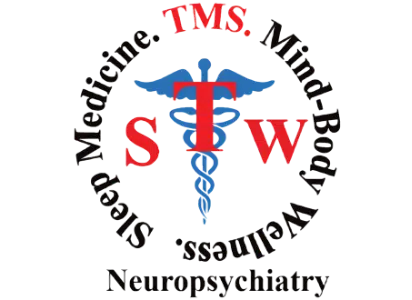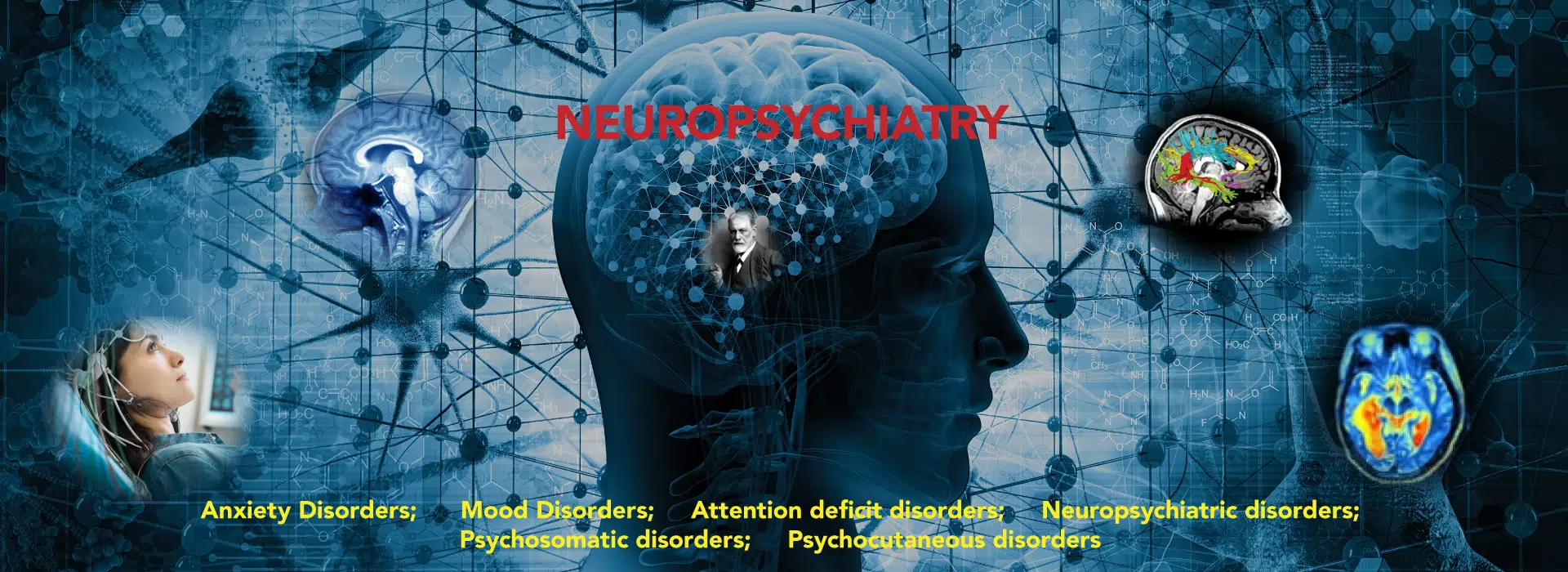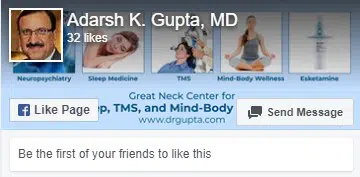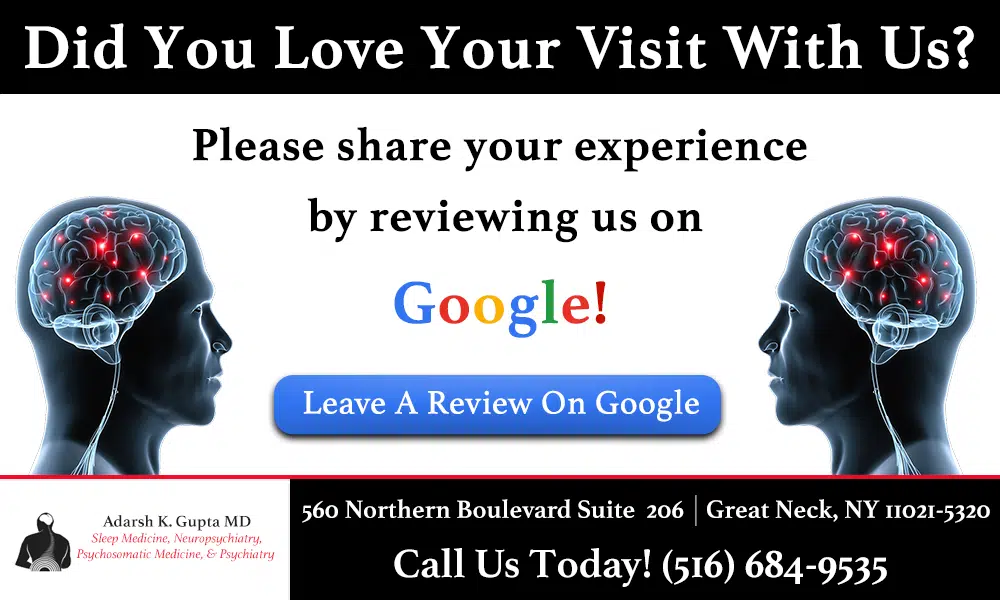Our practice is committed to providing you with a superior level of care in a friendly and personalized environment. We are very proud of the relationships that we have established with our patients. We are focused on maintaining your trust and confidence. We are especially honored that our patients have referred so many of their friends and relatives to our practice. We look forward to making lasting relationships with every patient we meet.
Neuropsychiatry Services:
- Comprehensive consultation for evaluation of any psychiatric, neuropsychiatric, sleep or psychosomatic disorder.
- Psychopharmacological expertise in treating psychiatric disorders
- Cutting edge testing for presence of sleep and neuropsychiatric disorders
- Novel treatments such as TMS (transcranial magnetic stimulation) and Spravato
- CPAP treatment follow up for Obstructive sleep apnea.
- Individual psychotherapy
Testing Offered:
- Pharmacogenetic Testing: Study results show significant improvement in treatment outcomes for psychiatric patients after undergoing pharmacogenetic testing.
- Home Sleep Testing (HST): to diagnose presence of obstructive sleep apnea (OSA)
- PSG (Polysomnography): overnight sleep study in sleep lab for assessment of OSA and other sleep disorders like narcolepsy, REM behavior sleep disorder and sleep disorders in neurological diseases.
- CNS Testing (Computerized cognitive testing): Neurobehavioral Exam for objective assessment of cognitive impairments in ADD/ADHD, mild cognitive impairment, TBI etc.
- EEG, EKG: to rule out presence of seizures in neuropsychiatric disorders.
- LABs: blood work to detect presence of specific deficits in various neuropsychiatric and psychosomatic disorders.
Thank you for choosing us to be your Psychiatry health care provider!
Please feel free to call us to make an appointment: (516) 684-9535
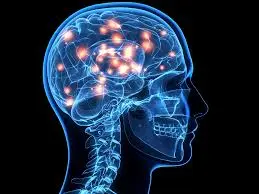
Common Psychiatric and Neuropsychiatric Disorders:
- ADHD
- Anxiety
- Concussion
- Depression
- Epilepsy
- Mild Cognitive Impairment
- Parkinson’s
- Post Traumatic Stress Disorder
- Traumatic Brain Injury
ADHD
Attention-deficit/hyperactivity disorder (ADHD) (1) is a brain disorder marked by an ongoing pattern of inattention and/or hyperactivity-impulsivity that interferes with functioning or development.
Symptoms: Inattention and hyperactivity/impulsivity are the key behaviors of ADHD. Some people with ADHD only have problems with one of the behaviors, while others have both inattention and hyperactivity-impulsivity.
Diagnosis of ADHD: Diagnosis of ADHD requires a comprehensive evaluation by a licensed clinician, such as a pediatrician, psychologist, or psychiatrist with expertise in ADHD. For a person to receive a diagnosis of ADHD, the symptoms of inattention and/or hyperactivity-impulsivity must be chronic of long-lasting, impair the person’s functioning, and cause the person to fall behindnormal development for his or herage. The doctor will also ensure that any ADHD symptoms are not duetoanother medical or pscyhiatric condition.
Treatment: While there is no cure for ADHD, currently available treatments can help reduce symptoms and improve functioning. A professional counselor or therapist can help anadult with ADHD learn how to organize his or her life with tools such as:
– Keeping routines
– Making lists for different tasks and activities
– Using a calendar for scheduling events
Anxiety
Occasional anxiety is a normal part of life. You might feel anxious when faced with a problem at work, before taking a test, or making an important decision. But anxiety disorders (2) involve more than temporary worry or fear. For a person with an anxiety disorder, the anxiety does not go away and can get worse over time. The feelings can interfere with daily activities such as job performance, school work, and relationships. There are several different types of anxiety disorders. Examples include generalized anxiety disorder, panic disorder, and social anxiety disorder.
Generalized Anxiety Disorder: People with generalized anxiety disorder (3)display excessive anxiety or worry for months and face several anxiety-related symptoms.
Panic Disorder: People with panic disorder (4) have recurrent unexpected panic attacks, which are sudden periods of intense fear that may include palpitations, pounding heart, or accelerated heart rate; sweating; trembling or hsaking; sensations of shortness of breath, smothering, or choking; and feeling of impending doom.
Social Anxiety Disorder: People with social anxiety disorder (5) (sometimes called “social phobia”) have a marked fear of social of performance situations in which they expect to feel embarrassed, judged, rejected, or fearful of offending others.
Treatment: Anxiety disorders ar genreally treated with psychotherapy, medication, or both.
Depression
Depression (9) (major depressive disorder or clinical depression) is a common but serious mood disorder. It causes severe symptoms that affect how you feel, think, and handle daily activities, such as sleeping, eating, or working.
Symptoms: If you have been experiencing some of the following signs and symptoms most of the day, nearly every day, for at least two weeks, you may be suffering from depression:
- Persistent sad, anxious or “empty” mood
- Feelings of hopelessness, or pessimism
- Irritability
- Feelings of guilt, worthlessness, or helplessness
- Loss of interest or pleasure in hobbies and activities
A full list of signs and symptoms for depression can be found here.
Treatment: Depression, even the most severe cases, can be treated. The earlier that treatment can begin, the more effective it is. Depression is usually treated with medications, psychotherapy, or a combination of the two. If these treatments do not reduce symptoms, electroconvulsive therapy (ECT) and other brain stimulation therapies may be options to explore. A recently FDA approved intranasal eskatamine treatment spray is available for patients with Treatment Resistant Depression, those who have tried two or more oral antidepressants and remained symptomatic, and is administered under supervision in office in conjunction with oral antidepressant therapy.
Epilepsy
Epilepsy (10) is a central nervous system (neurological) disorder in which brain activity becomes abnormal, causing seizures or periods of unusual behavior, sensations, and sometimes loss of awareness.
Neuropsychiatry: Research suggests that there is a bidirectional relationship between epilepy and mood disorders and between epilepsy and suicide. Mood and anxiety disorders are the most frequently reported psychiatric comorbidities with epilepsy, with a prevalence of 20-22%. Mood disorders in epilepsy frequently go unrecognized and untreated because of lack of time, lack of training and clinicians’ reluctance to refere patients because of psychiatric symptoms.
Mild Cognitive Impairment (MCI)
Mild cognitive impairment (MCI) (11) is an intermediate stage between the expected cognitive decline of normal aging and the more-serious decline of dementia. It can involve problems with memory, language, thinking and judgment that are greater than normal age-related changes.
Parkinson’s
Parkinson’s disease (12) is a progressive disorder of the nervous system that affects movement. It develops gradually, sometimes starting with a barely noticeable tremor in just one hand. But while a tremor may be the most well-known sign of Parkinson’s disease, the disorder also commonly causes stiffness or slowing of movement.
Neuropsychiatry: A host of neuropsychiatric disorders are intrinsic to Parkinson’s Disease or occur as a complication of the domamingeric therapies or anticholinergic medications used to treat the motor symptoms. Disorders intrinsic to Parkinson’s disease include depression, anxiety disorders, apathy, impaired executive function, anehedonia and others. Disorders associated with dopamingeric therapies include hallucinations, paranoia, impulse control disorders, compulsive behaviors, delirium, and/or dopamine dysregulation syndrome. (13)
Post-Traumatic Stress Disorder (PTSD)
PTSD is a disorder that develops in some people who have experienced a shocking, scary, or dangerous event. It is natural to feel afraid during and after a traumatic situation. Fear triggers many split-second changes in the body to help defend against danger or to avoid it. This “fight-or-flight” response is a typical reaction meant to protect a person from harm. Nearly everyone will experience a range of reactions after trauma, yet most people recover from initial symptoms naturally. Those who continue to experience problems may be diagnosed with PTSD. People who have PTSD may feel stressed or frightened even when they are not in danger. (14)

He has academic affiliation and privileges with LIJ and North Shore medical center.
Dr. Gupta was Attending CL Psychiatrist & Assistant Professor in psychiatry at LIJ Hospital for 14 years.
He did his psychiatry residency training at NYU and completed fellowships in Psychosomatic medicine (LIJ Medical Center); Brain Imaging (Mount Sinai Hospital) and Neuropsychiatry (Harvard Medical School).
Neuropsychiatry Services:
- Comprehensive Neuropsychiatric Consultation
- Psychopharmacology expertise in use of Psychotropic medications
- Pharmacogenetic testing to improve treatment outcomes in difficult to treat disorders
- Neuropsychological testing: by computerized CNS testing, neurobehavioral exam
- EEG & Q EEG testing in neuropsychiatric disorders (coming soon).
- Use of Neuromodulatoin Treatments:TMS
Common Neuropsychiatric Disorders:
Anxiety disorders, OCD, PTSD, etc.
Mood disorders: Major depressive disorders, BAD
Attention deficit disorder & Mild cognitive impairments
Stress related conditions affecting medical disorders
Neuropsychiatric disorders associated with TBI, Epilepsy, PD, MS, Cognitive Impairment, etc.
Psychocutaneous disorders
Psychosomatic disorders
Diagnostic Impression:
Formulated on multi-dimensional understanding of brain-mind-body interactions
Treatment:
Based on integration of psychotropic medications, psychotherapy, stress reduction and promoting overall wellness.
References:
1) National Institute of Mental Health (2016). Attention Deficit Hyperactivity Disorder. Retrieved January 2, 2018 from https://www.nimh.nih.gov/health/topics/attention-deficit-hyperactivity-disorder-adhd/index.shtml.
2) National Institute of Mental Health (2016). Anixety Disorders. Retrieved January 2, 2018 from www.nimh.nih.gov/health/topics/anxiety-disorders/index.shtml.
3) National Institute of Mental Health (2016). Generalized Anxiety Disorder: When Worry Gets Out of Control. Retrieved January 2, 2018 from https://www.nimh.nih.gov/health/publications/generalized-anxiety-disorder-gad/index.shtml.
4) National Institute of Mental Health (2016). Panic Disorder: When Fear Overwhelms. Retrieved January 2, 2018 from https://www.nimh.nih.gov/health/publications/panic-disorder-when-fear-overwhelms/index.shtml.
5) National Institute of Mental Health (2016). Social Anxiety Disorder: More Than Just Shyness. Retrieved January 2, 2018 from https://www.nimh.nih.gov/health/publications/social-anxiety-disorder-more-than-just-shyness/index.shtml.
6) Mayo Clinic (2014). Traumatic Brain Injury. Retrieved January 2, 2018 from https://www.mayoclinic.org/diseases-conditions/traumatic-brain-injury/symptoms-causes/syc-20378557.
7) Mayo Clinic (2017). Concussion. Retrieved January 2, 2018 from www.mayoclinic.org/diseases-conditions/concussion/symptoms-causes/syc-20355594.
8) Psychiatric Times (2015). Managmeent of Mild Traumatic Brain Injury. Retrieved January 2, 2018 from www.psychiatrictimes.com/neuropsychiatry/management-mild-traumatic-brain-injury/page/0/1.
9) National Institute of Mental Health (2016). Depression. Retrieved January 2, 2018 from https://www.nimh.nih.gov/health/topics/depression/index.shtml#part_145397.
10) Psychiatric Times (2015). Epilepsy and Seizures: Neuropsychiatric Implications. Retrieved January 2, 2018 from www.psychiatrictimes.com/epilepsy-and-seizures-neuropsychiatric-implications.
11) Mayo Clinic (2017). Mild Cognitive Impairment. Retrieved January 13, 2018 from https://www.mayoclinic.org/diseases-conditions/mild-cognitive-impairment/symptoms-causes/syc-20354578.
12) Mayo Clinic (2015). Parkinson’s Disease. Retrieved January 2, 2018 from https://www.mayoclinic.org/diseases-conditions/parkinsons-disease/symptoms-causes/syc-20376055.
13) Psychiatric Times (2015). Management of Psychosis in Parkinson Disease. Retrieved January 2, 2018 from www.psychiatrictimes.com/special-reports/management-psychosis-parkinson-disease.
14) National Institute of Mental Health (2016). Post-Traumatic Stress Disorder. Retrieved January 2, 2018 from https://www.nimh.nih.gov/health/topics/post-traumatic-stress-disorder-ptsd/index.shtml.
